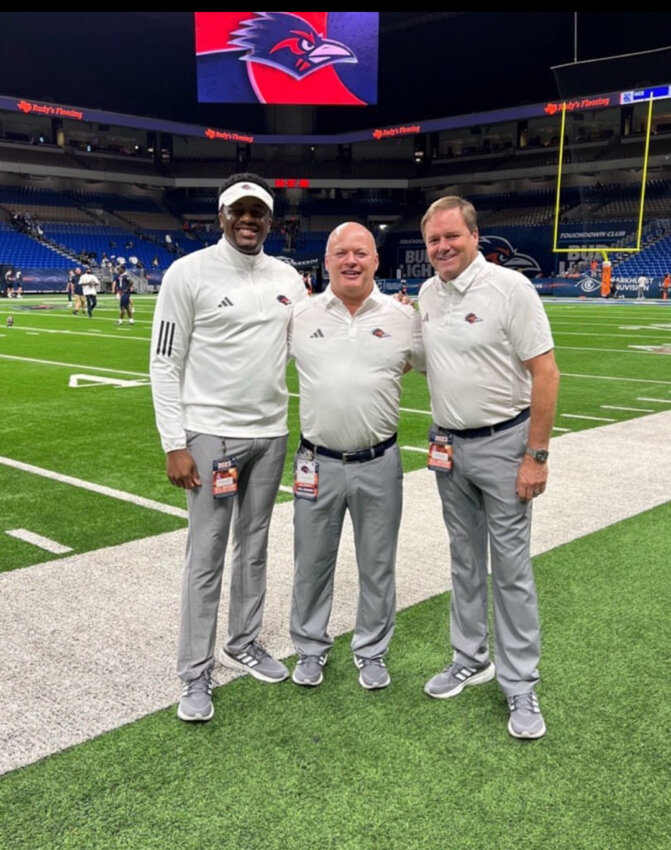On a Saturday in April 2023 at The University of Texas at San Antonio (UTSA) football practice field, Thomas DeBerardino, MD, an orthopaedic surgeon with UT Health San Antonio who specializes in sports medicine, particularly knee meniscal injuries, noticed a slightly older athlete on crutches and asked about him.
“Someone told me, ‘Oh, that’s just Frank. He’s injured and recovering,’” DeBerardino said.
UT Health San Antonio is the official health care partner for the UTSA Athletic Program and it was DeBerardino’s first time on the field ready to help any athlete needing medical attention. Deberardino serves as the head orthopaedic surgeon for the program.
In that moment of first seeing “Frank,” DeBerardino didn’t know that the student on crutches was the much-lauded Frank Harris, the star quarterback of the two-time conference championship team. Nor did DeBerardino realize that in less than a week, he would change Harris’ football college career trajectory.
Playing football since he was five years old, Harris was plagued with injuries to his knee, shoulder and ACL during his high school and college football careers. Despite the injuries, he had led the UTSA Roadrunners to winning seasons.
After a knee infection that left Harris in excruciating pain and with intense swelling and very little mobility after the 2022 season, he considered a medical retirement from football that would leave him unable to play in the final year of his college football eligibility.
“We stayed at his house for a month because he couldn’t get around,” said Tulita Harris, the quarterback’s mother. “At one point, I told him, if you don’t make it out onto that football field, maybe God’s trying to tell you something.”
Injuries were an expected challenge for Harris’ parents. Tulita Harris and her husband, Darrell, were high school athletes, and Harris’ three siblings also played sports.
“Those injuries are life’s lessons to figure out how to get around obstacles and situations and get through it,” Darrell Harris said.
Harris’ parents, who never missed seeing their son play, were worried but stood by Harris’ side supporting him throughout his playing years and each injury.
On that fateful day in April, DeBerardino offered his help to make Harris’ knee “less worse,” as he liked to tell Harris and his family. He offered no guarantee about Harris’ chances to play on the gridiron again.
“Frank’s parents are amazing people who are dedicated to what is best for him. They didn’t have any predetermined conditions. They just looked me in the eye when I said our team would do our best for Frank and we would always be honest with them. If I believed he couldn’t play, I would be the first to say it,” he said.
After an MRI, lab work, X-rays and finally learning who Harris was to the championship team, DeBerardino recommended yet another surgery to the family.
“Football was not our number one concern at that point. It was just getting Frank back to walking and his quality of life,” Tulita Harris said.
The family banded together and supported Harris as he decided to proceed with the surgery. Three days after meeting DeBerardino, Harris was back on the operating table to have scar tissue removed from his knee.
After a previous knee manipulation to break up the scar tissue, it remained around the knee like “a pile of leaves,” blocking movement, DeBerardino said. The goal of the surgery was to meticulously remove the scar tissue both surgically and arthroscopically.
“Until someone goes in and removes all the debris, there’s really no chance of moving forward. The knee and every joint remembers every injury, whether significant or not,” DeBerardino said. “Wherever scar tissue is taking up space, the joint can’t function as well. The pile of leaves analogy turned the tide in everyone’s belief that there was a fighting chance.”
While the surgery was successful, DeBerardino then worked with Harris, his family and the team’s coaching and training staff to understand the complexity of Harris’ recovery and rehabilitation. It would require monitoring practice and playing time to avoid exhausting Harris’ knee.
“We had to try and thread the needle so he would play at an elite level but not overdo it. We didn’t know how it was going to play out. There might be times he would need some downtime,” DeBerardino said. “Everyone was willing to do what it took because Frank was willing to do everything it took to keep himself out there.”
DeBerardino understands the need for an inner fortitude to move forward after an injury, especially at the elite level. In high school, he played three sports and, while attending the U.S. Military Academy, suffered a severe ankle injury.
Like Harris, that injury led to a change in his career path. While recovering, he got to know the sports medicine physicians helping him with his injury. He had already decided to attend medical school after graduation to help injured soldiers, but his positive experience pointed him in the direction of specializing in orthopaedics.
“I’m colorblind. Everything in medicine is based on purples, greens and reds, but orthopaedics didn’t care if I was colorblind. It’s a good thing there was something for me,” he said.
As the UTSA football team prepares for the Scooter’s Coffee Frisco Bowl with an 8-4 winning season, DeBerardino is proud of his part in helping Harris meet his goal of returning to the field.
“It’s very rewarding and humbling to use the training that I’ve had with all my mentors over the decades to come up with a plan that we didn’t know would work but were hopeful,” he said. “I didn’t know how amazing of a person he was and that he would fight through this with such energy and enthusiasm. Frank is destined for huge things that will be exciting and amazing for us all.”
DeBerardino is the division chief of sports medicine at UT Health San Antonio. To learn more about the Sports Medicine program at UTHealth San Antonio, visit UTHealthCare.org/SportsMedicine or call 210-56-SPORT.


